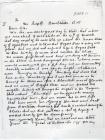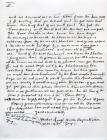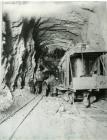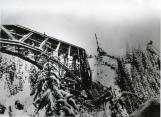14
Letter from Superintendant to F. Baker regarding a letter from the brother of one of the men killed in the March 4 1910 snowslide.15
Letter from Thos. H. Martin regarding his brother's death in the avalanche in Rogers Pass.21 April 1910
London, England

16
Handwritten letter from Thos. H. Martin of England regarding his brother's death in the March 4, 1910 snowslide in Rogers Pass.17
After the slide, there was a massive effort to remove the bodies of the 58 men and to clear the railway. Many Revelstoke residents volunteered for this job, working alongside CPR work crews. A letter from an East Indian crew boss to the Revelstoke CPR Superintendent tells of their experience:"Dear Sir,
We, the undersigned beg to state that when we reached Revelstoke on the 4th of March that day most of the men told us about the snow slides of Rogers Pass and told us that Rogers Pass is very cold place but we did not refused to go to Rogers Pass. When sixty men died under the slide, we never frightened, and been working all the time in the slides, in such dangerous places, where a man would never work for $4 a day, and we been working heartily whether it was day or night, whether we were hungry or thirsty, thinking that it was bad time on the company, and it was bad time on us too. During the slides our car and blankets was at Glacier and we were at Rogers Pass, and we passed six nights, sitting all through the nights in the engine shed without blankets, we suffered so many troubles that time, that we never had in our life that time one or two gang of Hindoos went back from Revelstoke hearing that death accident during the slide, but we did not care a bit of dying and worked hearty for the company.
You, yourself know that we received one letter from the Great Northern Co. $1.75 per day and we received one or two letters from the sawmills $2 per day. But we did not quit the job even that time, thinking that if we will quit the job the Company will think that the Hindoos are no good. The Road Master is here since two three days, he annoys us too much. He abuse us all the time, and catches us by the neck and shoulder, and gives us push and kicks us with his legs. Six, seven men have gone seeing his such treatment and now all the rest of the men are tired of his such treatment, and since the Italian Gang came here, he gives us too much trouble, abuse us all the time, we do not like to be abused, even for hundred $, and he never says a word to the Italians, we been working here in this country since two three years, we never saw such treatment by the Road Master towards the boys, we do not want to work under this Road Master. We are ready to work in any other Division, if you do not get job for us, then please send us to Vancouver, because there is no fault in us, we are poor men. In the time of the slide I supplied 26 men to the Company.
We shall be highly obliged to you for this kind act of yours.
Hoping favourable orders, and you can ask the Foreman (Geo Lodge) about our work and ask any other Foreman under whom worked. You yourself can see our work with any other Gang.
Yours obediently,
Mehar Singh, Hindoo Boss and all other men, of the Gang
18
Page 1 of a letter written by East Indian workers to the superintendant of the C.P.R.1910
Revelstoke, British Columbia, Canada

19
Page 1 of a letter written by workers of Hindu descent to the superintendant of the C.P.R in Revelstoke.20
Page 2 of a letter written by East Indian workers to the superintendant of the C.P.R.1910
Revelstoke, British Columbia, Canada

21
Page 2 of a letter written by workers of Hindu descent to the superintendant of the C.P.R in Revelstoke.22
On January 28, 1929, the bridge at Cutbank, over Surprise Creek Bridge, east of Rogers Pass, collapsed under the weight of Engine 5767. Engineer Bert Woodland and fireman Jeff Griffiths both died when the engine fell into the ravine. A new bridge over the ravine was in place by February 17, 1929.24
Collapse of Cutbank Bridge 1929.25
As a direct result of the 1910 snow slide, the decision was made to construct a tunnel through the mountains of Rogers Pass, bypassing the most treacherous avalanche areas. The tunnel was five miles long and shortened the main line by 4.5 miles, reduced the summit elevation 552 feet and eliminated 2600 degrees of curvature. Work began on the tunnel in August of 1913 and it was opened on December 9, 1916.26
Inside the Connaught Tunnel during construction.1915
Rogers Pass, Selkirk Mountains, British Columbia, Canada

